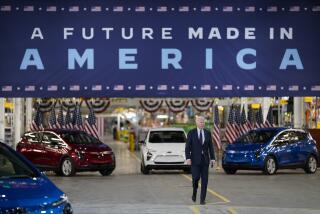Consumer Reports: Turbocharged cars’ gas mileage not as advertised
Consumer Reports is blasting the new slate of turbocharged cars, saying they fail to live up to fuel economy claims.
Ford Motor Co. comes in for particularly harsh grading. The newly released tests revealing that two turbo versions of its bread-and-butter Fusion midsize sedan fail to deliver either the power or the efficiency of non-turbo competitors such as the Honda Accord. The magazine found similar results for turbocharged versions of Ford’s Escape small SUV and Ford F-150 pickup truck.
“Don’t take turbocharged engines’ eco-boasts at face value,” wrote the magazine, poking fun at Ford’s Ecoboost sub-brand for turbocharged cars.
Complete test results: Turbo vs. nonturbo fuel economy
Turbocharging has become a primary strategy to increase fuel economy for many automakers, notably Ford, General Motors, Volkswagen and BMW. Representatives of those automakers told The Times in recent interviews that they plan to continue expanding turbocharged offerings because the technology offers greater efficiency without sacrificing performance.
But on every turbo model tested, Consumer Reports found lower fuel economy than indicated by ratings from the Environmental Protection Agency. On the Fusion, for instance, the magazine found that the 1.6-liter four-cylinder version of the engine returned 25 mpg, compared with its 28 mpg EPA rating for combined city and highway driving.
The Fusion and other turbos also trailed competitors in both efficiency and acceleration, the tests found. Honda’s Accord and Nissan’s Altima -- both with larger, non-turbo four-cylinders -- returned 30 and 31 mpg, respectively. Both cars had zero-to-60 mph times of 8.2 seconds, compared with 8.9 seconds in the Fusion 1.6-liter turbo.
Ford released a statement in response to the turbo testing. The magazine’s “findings are not consistent with our internal and external feedback. It shows EcoBoost vehicles lead in customer satisfaction for fuel economy across segments -- including surveys by J.D. Power,” it said.
Consumer Reports in some cases compared turbo and non-turbo versions of the same model from the same manufacturer, as with the Ford F-150 pickup and the Chevrolet Cruze.
On the Cruze, the more expensive turbocharged engine option proved to have marginally quicker acceleration, with a zero-to-60 mph time of 9.8 seconds compared with 10.5 seconds in the non-turbo version. But both models got 26 mpg.
General Motors released a statement implying that the testers might have driven more aggressively than the average Cruze owner does. “If you have a heavy foot on a turbocharged engine, you’re not necessarily going to see a lot of fuel economy benefits. As is generally the case, the improved fuel economy you get is really dependent on how you drive.”
Consumer Reports also found identical fuel economy -- 15 mpg -- for the twin-turbo Ecoboost engine and the 5.0-liter V-8 engine option.
“The EcoBoost engine is smooth, pretty quiet, refined. It’s a nice engine,” said Consumer Reports testing director Jake Fisher. “But it didn’t get any better fuel economy than the 5.0-liter V-8, which is a great engine. Personally, I like the grunt and the sound of the V-8. I don’t think I’d pay the extra money for the smaller motor.”
ALSO:
Full coverage: Detroit Auto Show
Top ten cars destined to be collector’s items
Consumer Reports: Toyota, Ford, Honda rank best in consumer perception
@LAThevenot on Twitter







